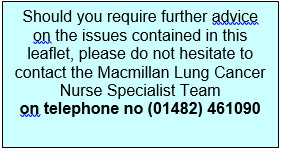- Reference Number: HEY843/2022
- Departments: Oncology (Cancer Services)
- Last Updated: 31 December 2022
Introduction
This leaflet has been produced to provide you with general information about the Breathlessness Clinic held at Castle Hill Hospital. It is not intended to replace the discussion between you and your doctor, but may act as a starting point for discussion. If after reading it you have any concerns or require further explanation, please discuss this with a member of the healthcare team caring for you.
What is the Breathlessness Clinic?
Breathlessness itself is not harmful to you but can be upsetting and frightening. It may affect how well you are able to do things such as climbing stairs, bathing, walking, going out etc.
The aim of this clinic is to identify what you want to achieve to manage your breathlessness and then see how we can help you do this. This is why your healthcare professional may ask you to attend.
What happens at the clinic?
The clinic is run by Senior Physiotherapist specialising in the management of breathlessness. You should see the same physiotherapist each time you attend and you will learn about different strategies to help you manage your breathlessness. You will be encouraged to practice techniques demonstrated to you and progress will be reviewed at follow up visits or telephone reviews.
How often will I have to come?
This clinic operates every Friday morning in the Queen’s Centre for Oncology and Haematology. Further appointments may be arranged, these may be on consecutive weeks or spaced out at slightly longer intervals. This will depend on your individual needs.
Please let us know if you have difficulty attending any of the appointments, and we will try to be as flexible as possible. Your first appointment will take approximately 1 hour, if any further appointments are needed, they would take up to 30 minutes.
What else do I need to know?
Being breathless can be a very frightening experience, for you and the people who is with you at the time. The aim of this clinic is to help you, your family and carers manage the breathlessness in a constructive way. Therefore if you have someone who would like to attend with you they would be very welcome.
Who do I contact about this clinic?
If you have any questions about the Breathlessness clinic, or if you are unable to attend your appointment; please contact the Macmillan Lung Nurse Specialist Team on tel: 01482 461090.
Alternatively, there is a Breathlessness clinic held at the Dove House Hospice, run by the Physiotherapist Team and you can make an appointment directly by calling tel: 01482 785721 or the Macmillan Lung Nurse Specialist Team can refer on your behalf.

This leaflet was produced by the Macmillan Lung Cancer Nurse Specialist Team, Hull and East Yorkshire Hospitals NHS Trust and will be reviewed in December 2025
General Advice and Consent
Most of your questions should have been answered by this leaflet, but remember that this is only a starting point for discussion with the healthcare team.
Consent to treatment
Before any doctor, nurse or therapist examines or treats you, they must seek your consent or permission. In order to make a decision, you need to have information from health professionals about the treatment or investigation which is being offered to you. You should always ask them more questions if you do not understand or if you want more information.
The information you receive should be about your condition, the alternatives available to you, and whether it carries risks as well as the benefits. What is important is that your consent is genuine or valid. That means:
- you must be able to give your consent
- you must be given enough information to enable you to make a decision
- you must be acting under your own free will and not under the strong influence of another person
Information about you
We collect and use your information to provide you with care and treatment. As part of your care, information about you will be shared between members of a healthcare team, some of whom you may not meet. Your information may also be used to help train staff, to check the quality of our care, to manage and plan the health service, and to help with research. Wherever possible we use anonymous data.
We may pass on relevant information to other health organisations that provide you with care. All information is treated as strictly confidential and is not given to anyone who does not need it. If you have any concerns please ask your doctor, or the person caring for you.
Under the General Data Protection Regulation and the Data Protection Act 2018 we are responsible for maintaining the confidentiality of any information we hold about you. For further information visit the following page: Confidential Information about You.
If you or your carer needs information about your health and wellbeing and about your care and treatment in a different format, such as large print, braille or audio, due to disability, impairment or sensory loss, please advise a member of staff and this can be arranged.

